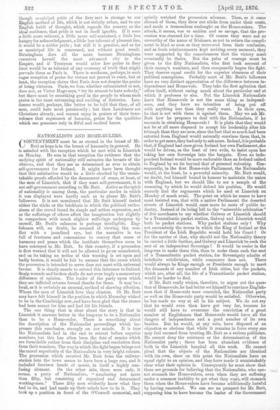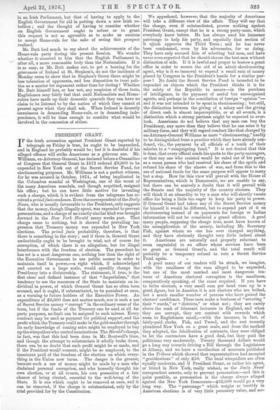NATIONALISTS AND HOME-RULERS.
CONTENTMENT must be as eternal in the breast of Mr. Butt as hope is in the breast of humanity in general. He is satisfied with the reception which he met with in Limerick on Monday. He sees in that reception the evidence that the undying spirit of nationality still animates the breasts of the citizens, and that they are as determined as ever to obtain self-government for Ireland. It might have been thought that this satisfaction would be a little checked by the unmis- takable proofs afforded by the demeanour of some, at least, of the men of Limerick, that if they want self-government, it is not self-government according to Mr. Butt. Active as the spirit of nationality is among them, the particular modes in which it was displayed were hardly such as to please Mr. Butt's followers. It is not mentioned that Mr. Butt himself tasted either the sticks or the brickbats in which the political enthu- siasm of the crowd found its simple and artless expression, and as the sufferings of others affect the imagination but slightly in comparison with much slighter sufferings undergone by oneself, Mr. Butt's calmness is perhaps intelligible. Eng- lishmen will, no doubt, be accused of viewing the con- flict with a jaundiced eye, but the narrative is too full of fractures and concussions to convey that sense of harmony and peace which the incidents themselves seem to have conveyed to Mr. Butt. In this country, if a procession is first warned that it will not be allowed to go on unmolested, and on its taking no notice of this warning is set upon and badly beaten, it would be fair to assume that the cause which the procession is intended to serve does not meet with universal favour. It is clearly unsafe to extend this inference to Ireland. Scalp wounds and broken skulls do not even imply a momentary difference of opinion. The leader of the party upon which they are inflicted returns formal thanks for them. It may be a loofa, as it is certainly an unusual, method of showing affection. Whom the men of Limerick love they chasten. Or Mr. Butt may have felt himself in the position in which Macaulay wished to be in the Cambridge row, and have been glad that the stones had been meant for him and had hit his friends.
The one thing that is clear about the story is that in Limerick it answers better in the long-run to be a Nationalist than to be a Home-ruler. There is something about the description of the Nationalist proceedings which im- presses this conclusion strongly on our minds. It is true the Nationalists had in the end to retreat before superior numbers, but this has often been the fate of armies which are formidable rather from their discipline and resolution than from their numbers. The way in which the fight began brings out the moral superiority of the Nationalists in very bright colours. The procession which escorted Mr. Butt from the railway- station into the town seems to have been a large one, and it included fourteen bands of music, in itself a highly con- fusing element. On the other side, there were only, it seems, a party of Nationalists, " numbering not more than fifty, but consisting of organised and determined working-men." These fifty men evidently knew what they had to do, and had made up their minds how to do it. They took up a position in front of the O'Connell memorial, and quietly watched the procession advance. Then, as it came abreast of them, they drew out sticks from under their coats, and made a tremendous onslaught on the Home-rulers. The attack, it seems, was so sudden and so savage, that the pro- cession was stunned for a time. Of course they were not so unworthy of the name of Irishmen as not to return the compli- ment in kind as soon as they recovered from their confusion, and as fresh reinforcements kept arriving every moment, they were supported by the consciousness that the victory must eventually be theirs. But the palm of courage must be given to the fifty Nationalists, who first took account of their enemy's numbers, and then composedly began the fight. They deserve equal credit for the superior clearness of their political conceptions. Probably most of Mr. Butt's followers have no very distinct appreciation of the difference between in- dependence and Home-rule. They take the first agitation that offers itself, without caring much about the particular end at which it professes to aim. But the Limerick Nationalists knew that Home-rule is not the same thing as independ- ence, and they have no intention of being put off with anything less than they really want. In their eyes, he that is not with them is against them. May we ask Mr. Butt how he proposes to deal with the Nationalists, if he succeeds in obtaining Home-rule ? It is plain that they would not be at all more disposed to accept his leadership after his triumph than they are now, since the fact that so much had been extorted from England would naturally convince them that, in order to get more, they had only to ask more. Indeed, it is probable that, if England had once given Ireland her own Parliament, she would be driven, as the least of two evils, to insist upon her taking her own Sovereign into the bargain. Even an inde- pendent Ireland would be more endurable than an Ireland united to England by no tie beyond that of personal rulership. Con- sequently, in the first Home-rule Parliament, the Nationalists would, at the least, be a powerful minority. Mr. Butt would, no doubt, feel himself bound in honour to maintain the union with England, but we should like to see a sample of the reasoning by which he would defend his position. He would scarcely find the arguments which he used at Limerick on Monday of much avail. The point on which he seems to have most insisted was, that with a native Parliament the deserted streets of Limerick would once more be seats of -public in- dustry. Instead of its being left to the "miserable arbitration" of five merchants to say whether Galway or Limerick should be a Transatlantic packet station, Galway and Limerick would both be packet stations. Why packet stations only ? Why not successively the towns in which the King of Ireland or the President of the Irish Republic would hold his Court ? Or for the matter of that, why should not the Nationality theory be carried a little further, and Galway and Limerick be each the seat of an independent govereign ? It would be easier in the long-run to make them this, than to make them each the seat of a Transatlantic packet station, for Sovereignty admits of
indefinite subdivision, while commerce does not. There would always be Kings enough or Presidents enough to meet the demands of any number of Irish cities, but the packets, which are, after all, the life of a Transatlantic packet station, would be harder to find.
If Mr. Butt really wishes, therefore, to argue out the ques- tion of Home-rule, he had better set himself to convince English- men that if Home-rule were conceded, the Nationalist party as well as the Home-rule party would be satisfied. Otherwise, he has made no way at all in his subject. We do not say that he would even then have got very far, because he would still have to overcome the conviction of a great number of Englishmen that Home-rule would have all the dangers of independence and a good number of its own besides. But he would, at any rate, have disposed of an objection so obvious that while it remains in force every one may feel excused from treating Mr. Butt as a serious politician. He cannot deny the existence or the determination of the Nationalist party ; there has been abundant evidence of both in the Limerick hospital all this week. He cannot plead that the objects of the Nationalists are identical with his own, since on this point the Nationalists have an equal right to an opinion, and they have made it unmistakably clear what their opinion is. Consequently he must show that there are grounds for believing that the Nationalists, who can- not stomach the Home-rulers, even when they are suffering under a common inability to get what they want, will stomach them when the Home-rulers have become additionally hateful by having succeeded. We can see no prospect for Mr. Butt, supposing him to have become the leader of the Government in an Irish Parliament, but that of having to apply to the English Government for aid in putting down a new Irish re- bellion ; and the thought of having to consider whether an English Government ought to refuse or to grant this request is not so agreeable as to _make us anxious to accept Home-rule for the sake of seeing this prospect realised.
Mr. Butt had much to say about the achievements of the Home-rule party during the present Session. We wonder whether it occurred to him that the English Parliament is, after all, a more reasonable body than the Nationalists. If it is so easy, as Mr. Butt makes out, to get a hearing for the grievances of Ireland at St. Stephen's, do not the incidents of Monday seem to show that in Stephen's Green there might be less toleration of opponents, and less disposition to treat poli- tics as a matter for argument rather than for rioting ? Whether Mr. Bntt himself has, or has not, any suspicion of these facts, Englishmen may fairly feel that until Nationalists and Home- rulers have made up their domestic quarrels they can have no claim to be listened to by the nation of which they cannot at present agree what they shall ask. When Ireland is decently unanimous in demanding Home-rule, or in demanding inde- pendence, it will be time enough to consider what would be involved in the concession of either.































 Previous page
Previous page